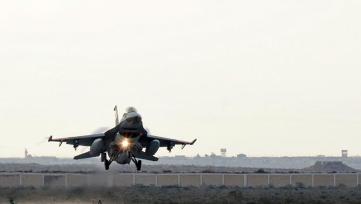Sudan’s Bashir criticises Egypt’s decision to launch air strikes against Libya
February 26, 2015 (KHARTOUM) – Sudanese president Omer Hassan al-Bashir has criticised Egypt for launching air strikes this month inside Libya in retaliation for the mass beheading of Egyptian Christians by militants claiming allegiance to the Islamic State in Iraq and Levant (ISIS).

In the video released by ISIS this month, masked men dressed in black marched the 21 Egyptian captives, who had gone to Libya in search of jobs, dressed in orange jump suits, at a beach the group said was near Tripoli. They were forced down onto their knees, and then beheaded.
The gruesome footage of the killing drew anger throughout Egypt and calls for revenge and military intervention against ISIS.
Al-Sissi warned in a televised address after the release of the video that his country would choose the “necessary means and timing to avenge the criminal killings”.
Afterwards the Egyptian military announced that bombed ISIS targets inside Libya hitting ISIS camps, training sites and weapons storage areas.
Sudan joins Qatar, its main Arab ally, which has reportedly expressed reservations over the strikes at a recent Arab League meeting.
Egypt’s envoy at the meeting hit back at Qatar during the meeting and accused it of supporting “terrorism”.
Afterwards Qatar recalled its ambassador in Cairo to protest the labelling.
Bashir said that he is working with countries in the region who also share the view of the need to start dialogue among Libya’s warring parties to reach a peaceful solution.
He acknowledged that his government pulled back its mediation efforts in Libya in favor of UN process despite kicking off contacts with several players in the conflict.
The Sudanese leader vehemently denied allegations of backing Islamist militias currently in control of Tripoli.
Last September, Libya’s internationally recognized Prime Minister Abdullah al-Thinni said Sudan had attempted to airlift weapons and ammunition to the new rulers in Tripoli.
Khartoum denied this, saying the weapons were meant for the joint border force.
Thinni’s main military partner, former army general Khalifa Heftar, has also accused Sudanese of having joined Ansar al-Shar’ia and other Islamist groups which are battling pro-government forces in the eastern city of Benghazi.
On the other hand the Tripoli government has accused Egypt and UAE of helping Heftar militarily. The US said last year that the two countries carried out air strikes on armed Islamist factions in Tripoli.
Bashir has recently returned home from a visit to UAE in which he offered cooperation with the latter in the Libyan crisis.
(ST)
